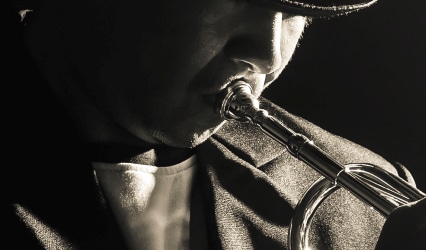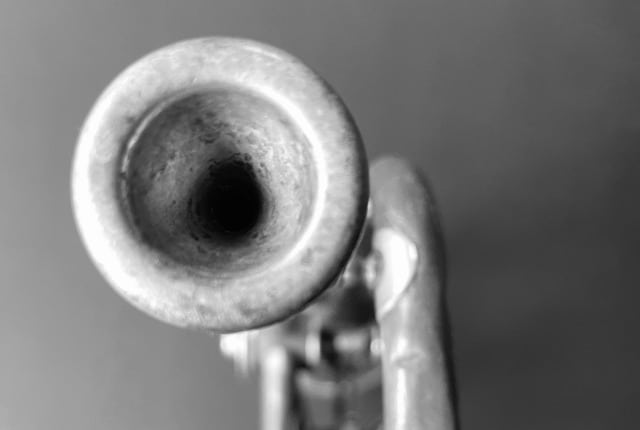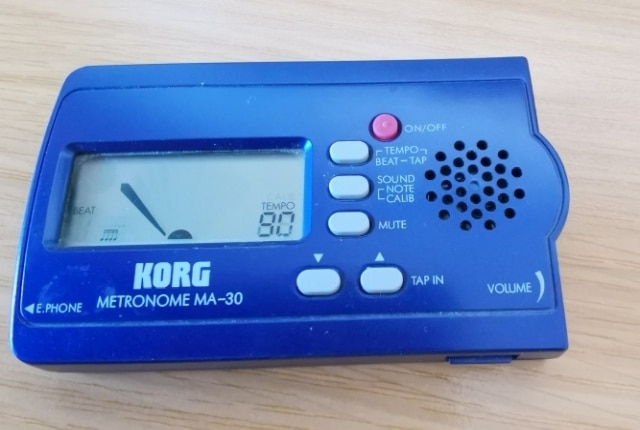Are you playing the trumpet and you notice you’re using a lot of pressure on the mouthpiece? Have you damaged tissue in your mouth from too much pressure? Let’s look at how you can reduce mouthpiece pressure when playing the trumpet.
The Problem With Mouthpiece Pressure
Obviously, pressure on your trumpet mouthpiece is important in order for you to make a sound and get the notes out. Without mouthpiece pressure, you won’t make a peep.
However, using too much pressure on your mouthpiece can lead to a number of injuries, like swelling of your mouth, rupture of your lips, hurting teeth, or other damage. Lip injuries can make playing the trumpet hard or impossible so you don’t want that to happen.
How To Use Less Trumpet Mouthpiece Pressure
There are several ways how to play trumpet with less mouthpiece pressure. To reduce the pressure on the mouthpiece when you’re playing the trumpet, follow these instructions:
Ease Your Grip On The Trumpet
Try to use less tension when you’re playing. Be aware of the tension you feel in your body when you’re playing. One good way to reduce the tension is to ease the grip on the trumpet.
- Get a tight grip on the trumpet with the left hand.
Your left hand is going to give the instrument stability. (This is reversed if you’re using a left-handed trumpet, of course.)
- Go easy with the right hand
With your right hand, touch the valves lightly. DO NOT grip the instrument, but hover above the valves lightly. This is where we’re taking the tension out, which will have an effect on the overall tension in your body and your lips.
Pay Attention To The Pressure
The second thing you can do is to really pay attention to when the pressure builds. Are you always playing with too much pressure, or are you only tensing up with certain high notes?
You’ll likely find it’s certain notes that make you use too much pressure, so identify those notes and work up to them. If you find it hard playing them, play around them. Play where it is comfortable.
As you slowly improve your regular playing, you will slowly become more comfortable with the more difficulty parts, too. This is what James Blackwell calls base building and it will benefit you in the long run.

Practice, But Don’t Overdo It
Regular practice is important to work on your technique and to build your chops. If you’re going to band practice or you’re playing in an orchestra, don’t let those general practice sessions be your only practice. Practice at home, too, so you don’t tire in those longer sessions.
Having said that, exhaustion is another reason why you might be using too much pressure. Practice regularly, warm-up before you do, but don’t practice for hours on end.
Your muscles need to relax, so to avoid fatigue, practice regularly for a shorter time (15-20 minutes) rather than once a week for one or two hours.
Looking for a teacher?
Want to get lessons at the comfort of your own home? Check out the course Learn to Play the Trumpet: Beginner to Pro Made the Easy Way* on Udemy! (See their full trumpet course line-up here*!)
How To Know If You’re Using Too Much Pressure On Your Mouthpiece
There are several signs that you’re using too much pressure on your trumpet mouthpiece when playing, like:
- Injuries on your lips
- Swelling of your mouth
- Painful teeth
You can also try the Bobby Shew mouthpiece pressure test explained by Kurt Thompson below.
This is similar to other suggestions of tying your trumpet to the ceiling and trying to get out a note. Realistically, you can’t very easily tie your trumpet to the ceiling unless you drill a hole and use a wall plug, so the Bobby Shew method is much easier to use.
Final Thoughts
Pressure on the trumpet mouthpiece is required in order to get notes out, but excessive pressure can cause you pain and injuries in your mouth and piece and will tire you out much more quickly. Try working to reducing the pressure by practicing regularly for short periods, and by releasing tension from your right hand on the valves. You can also practice with the Bobby Shew method to see if you’re making progress in reducing the mouthpiece pressure.
Related Posts:
- How To Clean A Trumpet (EASY Step-By-Step Guide)
- How to Fix Sticky Trumpet Valves & Other Common Problems
- How To Practice The Trumpet Quietly
- 9 Trumpet Books for Effective Self-Study
- Fascinating Trumpeter’s Trivia – Frequent Questions Answered
- Trumpet Mouthpieces – The Complete Guide
- How To Hit High Notes On A Trumpet
- How To Effectively Structure Your Trumpet Practice (6 Easy Steps To Improve Your Playing!)



